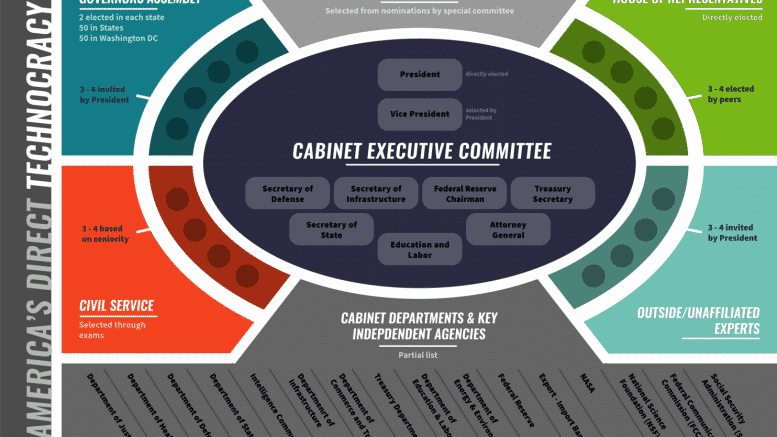After having written three books on Technocracy, reviewed over 230 important historical books and posted almost 5,000 related stories, there is a tendency to think that the subject is exhausted.
But, it is not.
Almost every day some new thing pops up that surprises me, whether from industry, academia or government. Historical tidbits constantly surface that show how analysts foresaw our current trajectory decades earlier. Modern scholars often write openly about Technocracy and Technocrats, especially in Europe or Asia, and yet America largely remains in the dark.
As I present my findings in public forums, whether speaking or writing, I am constantly aware of some kind of invisible wall that keeps the message from being fully understood or propagated. For instance, I have sent dozens of review copies of books to key centers of influence around the country, but how many reviews have actually been published? Hardly any. I have presented to elected officials, attorneys, civic leaders and scientists. How many have embraced any understanding of Technocracy? Again, hardly any.
However, for all the people who have confirmed their understanding and alarm of Technocracy, I am fully convinced that the material is easy enough to understand for anyone who is willing to understand it. Apparently, most are not willing. In some cases, people are too distracted with other things to pay attention. In other cases, people turn a blind eye because they find themselves profiting off some aspect of Technocracy and don’t want to upset their own applecart.
Whatever the case, America is largely missing the many siren calls for radical change in America. Here is a case in point.
Dr. Parag Khanna, a leading global scholar promoting Technocracy, speaks to elite groups all around the world. With bachelor’s and master’s degrees from the School of Foreign Service at Georgetown University and a PhD from the London School of Economics, Khanna has written several highly esteemed books on various aspects of globalization.
In 2017, Khanna released a book with the very pointed title Technocracy in America: Rise of the Info-State. Endorsed by many prominent globalists, it laid out the radical agenda of what a “direct Technocracy” would look like in America:
In America, direct technocracy would look like this: A collective presidency of about a half-dozen committee members backed by a strong civil service better able to juggle complex challenges; a multi-party legislature better reflective of the diversity of political views and using data technologies for real-time citizen consultation, and the Senate replaced by a Governors Assembly that prioritizes the common needs of states and shares successful policies across them; and a judicial branch that monitors international benchmarks and standards, and proposes constitutional amendments to keep pace with our rapidly changing times.
How would we get to a direct Technocracy? Khanna states that “it is time again for a new constitutional convention” and concludes that “only utilitarian thinking can bring about another progressive era.”
Of course, Americans can ignore Khanna, but the global elite don’t, because he is writing to their long-established goals of doing exactly what he proposes! Abolish the Senate and give the Constitution to the Supreme Court? Have a committee of Presidents? Adopt utilitarian thinking to promote progressivism?
This is not Marxism, Socialism or Communism. It is Technocracy. Everything else going on around us is a sideshow that provides nothing more than a convenient cover for those behind the curtain who are the real movers and shakers in the world.














Khanna is proposing rule by our ‘betters’, you know, members of an exclusive club, entry by invitation only. Applicants must share elitist values and opinions. Silver spoon inheritance normally required, exceptions will be made for particularly useful plebes. All others take their places in subordinate roles in the hierarchy.
Before Brave New World was written, E.M. Forster penned a novelette called “The Machine Stops.” I kept thinking of it during lockdown last year.
Forster’s world sounds like a technocracy in its final stages.
I agree read the machine stops it is all in there zoom calls, social isolation, lockdowns, distrust , automatic computers that know all about you.
ok, thanks
In practice, Technocracy has a lot in common with other systems that grant unlimited power to an elite, privileged ‘priesthood’ and those commonalities are fatal flaws that always destroy these systems – usually after they’ve murdered millions and ended civilizations. It does solve some of the structural “issues” of other collectivist systems that make their collapse inevitable, which is what made it attractive to China’s communists. I tend to think of it as fully matured totalitarianism.
So, you say “they” don’t understand what you say . . .
Yet, you yourself don’t understand that disease-causing viruses don’t exist!!
What is so difficult in showing the lie that cowers the majority to be the entrance gate for all other lies?
What is so difficult in understanding that as long as the same structure (the fake “society”) persists, the manipulation will not stop?!
You don’t have a clue what I do or don’t understand so I suggest you rein in your ignorance. If you have some substantive to say, then say it.
The vast majority of America’s citizenry are cross eyed and clueless when it comes to the subject of technocracy. They have bought into the idea that scientific and technological advances are necessary for modern progress. Add to the fact that most people are avid consumers of electronic devices which they see as indispensable to a twenty first century lifestyle. Over reliance on science and technology will have the cultural effect of increasingly transforming democracy into technocracy. This process will then lead to rule of the people through elected representatives being replaced by rule of technical experts backed up by scientific… Read more »
Having read your comment a thought immediately struck me which i’m throwing out here…’Technocracy is the new superstition!’ I must think about this, it perhaps reflects something, an aspect which lurks deep in our consciousness which we are only dimly aware of as we perhaps mistakenly perceive our evolution proceeds. It may even suggest the lack of an aspect…lets call it ‘God’ the absence of whom even in terms of ‘its’ merest abstraction unsettles us. Does this make any sense?
Just by the name in which Dr. Parag Khanna, titled his book makes me think its a comeback at the title of your book. Technocracy The Hard Road to World Order.
” a multi-party legislature better reflective of the diversity of political views and using data technologies for real-time citizen consultation,”
This is “agile governance” (h/t Amazing Polly). It parallels (and/or was the secular implementation of) “Synodality” of the St. Galen Mafia.
This is the ultimate end of the Enlightenment: the complete breakdown of social order into Flashmob Rule. The superstructure of a new Kingdom having been built (technocracy), the antichrist will ascend his throne as the one put forth to restore order and bring peace.
The London School of Economics is where the most useful tools get their indoctrinations polished up!
It might be technocracy but in my mind there is very little difference in the end between technocracy, socialism, marxism, fascism, communism. Unelected bureaucrats is the fountain head of communism. Once these people are selected (kind of like our elections today but without any machines or election day) you can never get rid of them.
Many years ago I read a fantasy novel which held a premise I haven’t forgotten. The premise was, Wizard’s first rule: People are stupid. I still believe this, but in a different way than I originally did. The problem is not cognitive stupidity, but social stupidity. This is why Americans won’t even think about technocracy and what the future will bring. We used to be a society which claimed rugged individualists as kings and heroes. Now we are a society which races to the 50 percentile. Social media has had a profound effect on group think and social engineering. We… Read more »
I can sense your frustration Pat! In the face of so much obvious and accumulating evidence its incomprehensible why more people are not aware of our forthcoming and long projected digital prison. Their mindset must reflect a sort of reversion to some deeply embedded psychological roots.
You have a good frustration-o-meter. Honestly, some people just like to argue and dispute just for the sake sewing discord. Others appear happy in their out-of=date world view that makes them comfortable. Yet many others just ignore clear evidence and play Russian Roulette with their own existence on earth. Now the evil transhumanist movement has allied with Technocrats to take over the entire health landscape of the world – driving DNA changes deep into our humanity. All of today’s scoffers or willfully ignorant will howl and wail when they realize they are trapped like wild pigs in a pen, and… Read more »
Thanks Pat…i’ll have to read ur reply again, i like to take things in…i’ve started ur Tech/Rising Book and ur light years ahead of the curve! I have a pdf of Sutton’s America’s Secret Establishment and have read briskly and re-reading Coleman’s Hierarchy simultaneously with yours …the disturbing aspect concerning how organized that system is its obvious effectiveness. I’ll treat myself to the hard/paper? copies of ur books soon. You put a lot into them thats for sure. I hope u are rewarded in the great beyond and this is not intended as a throw away remark. I expect that… Read more »
“For instance, I have sent dozens of review copies of books to key centers of influence around the country, but how many reviews have actually been published?”
Will make sure to do a written review once I finish The Evil Twins!
Dziękuję za wartościowy artykuł